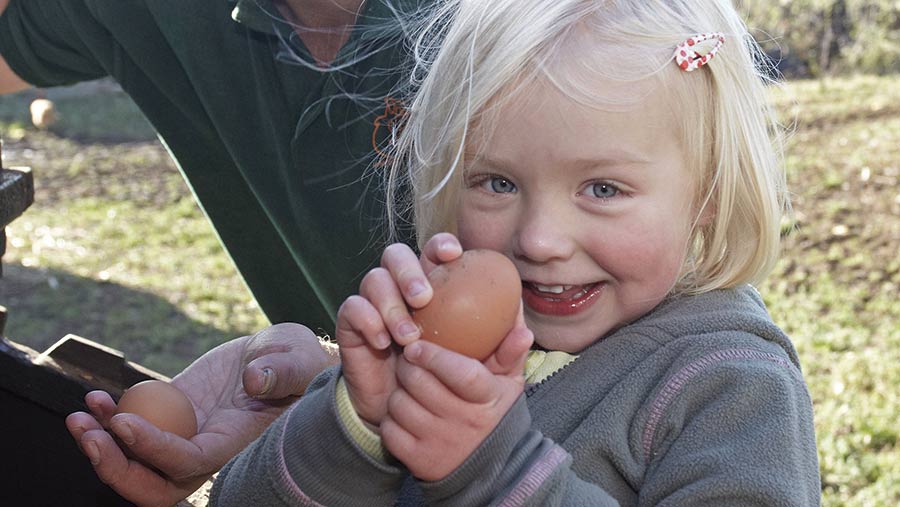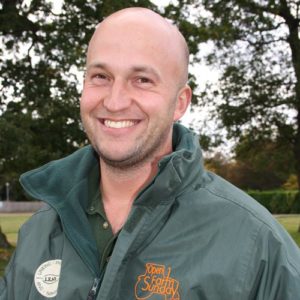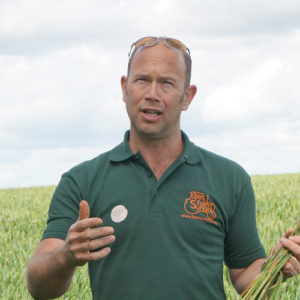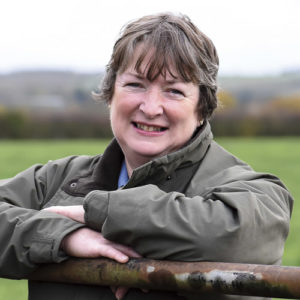Open Farm Sunday – advice for farmers running small events
 Open Farm Sunday
Open Farm Sunday Farming’s annual open day, Open Farm Sunday (OFS), is taking place on 11 June 2017, so there is still plenty of time to sign up and make preparations.
It’s not just an event for the large farms, either. Businesses of all sizes can open their gates to proudly show local communities the valuable work they do.
The event is a chance to bang the drum for farming and do your bit to bridge the town and country divide.
Since the first OFS in 2006, over 1,500 farmers across the UK have opened their gates and welcomed 1.8 million visitors.
See also: Open Farm Sunday: Myths, information and advice
We ask three businesses about their experiences of running small, community-focused events.
James Taylor, Broughton Grounds, Oxfordshire

James Taylor
Andrew and James Taylor’s farm is a traditional mixed family farm on the Broughton Castle estate running sheep, cattle and poultry, and growing wheat, barley and oats. The farm is in Natural England’s higher tier Countryside Stewardship scheme and encourages wildlife. They have hosted four OFS events.
What type of event do you host?
We aim for between 100 and 200 visitors who we take on a guided walk, field by field.
It’s about sharing some of the things we are most passionate about, including how our rotation builds up organic matter in the soil and how the different habitats we have created protect and enhance wildlife.
What advice would you give to any farmer who wants to keep their event small?
I use targeted Facebook advertising to reach the immediate area, as well as placing information in our parish magazine and calling the local paper who are always keen to help promote events. I also get in touch with our primary schools nearby to attract local families to our event.
Talk us through what you show people during the day.
A key feature of our farm walk is a field where there are 135 grassland species. We also talk about our six-year crop rotation – visitors are interested to learn about legume crops like clover and how they fix nitrogen in the soil. People are hungry to learn about the natural world.
We also show how the many thousands of earthworms that live here are an invaluable workforce, helping to keep our soil in good condition.
In the yard we include demonstrations such as sheep shearing and visitors can have a go at rolling a fleece and assessing whether lambs are ready for market in the sheep race. Let visitors get hands-on if at all possible.
How do visitors react?
People love to have the opportunity to spend some time on a real farm and enhance their knowledge. We always get a really positive reaction.
What support do you get from Linking Environment and Farming (Leaf)?
They provide a host of really useful information for farmers planning their events and also lots of great material to give to visitors on the day. The team is always at the end of a phone if I need anything and my regional coordinator is also very supportive and good to bounce ideas off.
Why do you think inviting people onto farms is so important?
As farmers, we can’t expect people to care about what we do if they don’t know about it. People have a big appetite to learn – all we have to do is to fulfil that appetite by sharing what we know. Showing people around is a really enjoyable thing to do.
Jake Freestone, Overbury Enterprises, Gloucestershire

Jake Freestone
Overbury Farms Enterprises is an arable and sheep farm in the Cotswold Area of Outstanding Natural Beauty. It is a Leaf Demonstration Farm that meets the rigorous environmental standards of the Leaf Marque.
Covering 1,590 hectares, there is an emphasis on conservation and maintaining traditional values while embracing modern technology, and a passion for educating the public about farming and rural life, which is why they have hosted IFS events since it began in 2006. Farm manager Jake Freestone explains more.
What advice would you give to any farmer who wants to keep their event small?
Decide how many people you can manage at a time, then organise timed walks or tours and ask visitors to pre-book. You need to make it clear in your entry on the OFS website how people can book.
We usually hold three farm tours, each with space for just under 30 people, all booked by telephone. Some farmers are using free online platforms like Eventbrite to take bookings.
If you want to keep it really local, then promote it just in the immediate area or village – this can be as simple as delivering flyers to the local primary school or homes near your farm.
Talk us through how your event works.
We organise three tractor and trailer tours throughout the day at 9am, 10.30am and midday. These are hosted by myself and Penelope, the farm owner. We try to give a really good overview of what we do – from the food we produce to the way we care for the countryside.
Visitors will see some of our livestock, have a look at the crops, visit our stud farm and learn about the many different conservation measures that are all part of the way we farm sustainably.
How do visitors react?
Really positively. The tours are always full and many people come back again and recommend the day to their friends. They particularly value having the opportunity to talk directly to a farmer and ask all the questions they have about food and farming.
What sort of questions do visitors ask?
Typically, about what is in the news or what issues are current. They are also very interested in how we use all the technology on the farm.
What sort of support do you get from Leaf?
They provide a host of support. To help you plan your event, there are webinars and a comprehensive handbook. There are regional coordinators who are always on hand to offer advice and support, and the Leaf team is at the end of the phone to answer queries.
For the day itself, Leaf provides lots of collateral, including banners, posters and leaflets, and in addition many of the sponsors also provide excellent material that you can give to your visitors.
Angela Rhodes, Wormleighton Grange Farm

Angela Rhodes © Ben Pike
Wormleighton Grange Farm in Warwickshire hosted its first OFS event in 2016. This family-run dairy farm milks 300 cows twice a day supplying milk to Arla and Tesco.
Angela Rhodes gives tips on preparation, and advice for farmers considering opening.
How many people attended your event?
We had 150, many of whom were families with children. We only opened for three hours in the afternoon but found that this was more than enough time for guests to see everything, as well as enjoy a (wholly essential) cream tea.
What could visitors see?
As it was our first year, we didn’t make any plans that were too ambitious, but stuck to what we know and activities we carry out every day. The most popular activity was the afternoon milking. Visitors were invited inside our herringbone milking parlour to see it in action.
Outside they could see feed and silage in barrels, plus some static machinery. We also ran a competition to guess how much milk four cows on the farm could produce.
What support did you get?
The support Leaf offered was great and included help with risk assessments, checklists and a comprehensive Host Farmer Handbook.
We worked with third parties including Arla, who provided product for visitors to taste, Tesco, who had a pop-up stand, and Red Tractor, who provided us with leaflets for our visitors. You can also order dairy resources direct from AHDB.
What advice would you give to any farmers thinking of opening up?
Don’t worry that you may not have a lot to show visitors. Remember that many have never been on a farm before and there will be plenty for them to explore and learn about. Everyday activities that we take for granted are fascinating to the public.
Why is OFS so important?
Before visiting our event, many people did not understand the scale of the job and that farming is a 365-day-a-year job. All our visitors were thoroughly interested to know more about our farm and everything that takes place here. It was a real pleasure to share our farm with them.
About OFS
More than 200 farms are already registered and all size and type of events are being planned from simple, private farm tours for local residents to larger-scale open days attracting hundreds.
Annabel Shackleton, manager of Leaf, who organises the event, says: “Open Farm Sunday is fully flexible. If it’s the first time a farmer is hosting an event they can keep it as small and as simple as they want.
“Even in remote rural areas many people don’t fully understand or value the work farmers do. There really is a place, and a need, for every farm to take part.
“As we prepare to leave the EU, it is so important for farmers to gain public support for the vital work they do. Open Farm Sunday provides the perfect platform for all sectors to unite and together shine a light on the whole British farming industry.”
For more information and to register your event online visit the OFS website.

